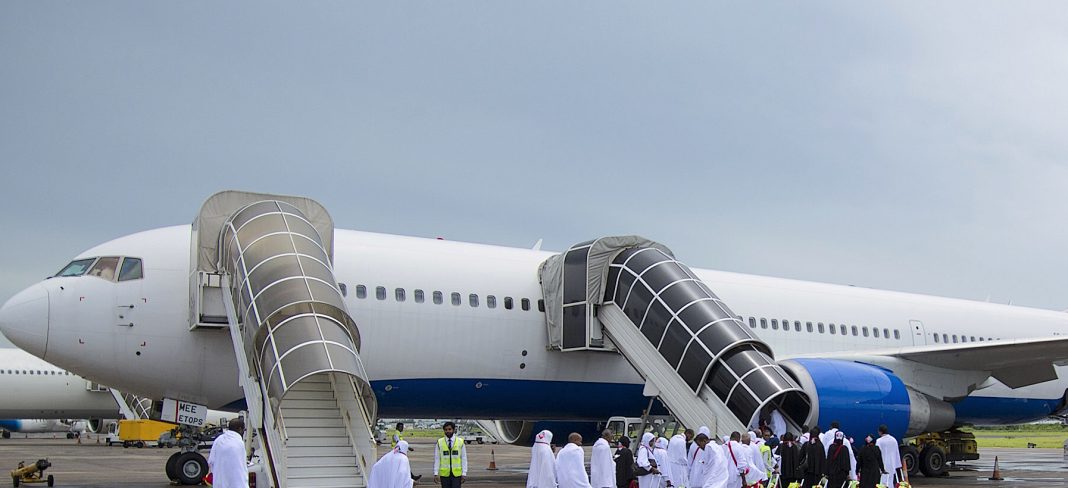Advanced flight bookings to airports around the holy city of Mecca ahead of this year’s Hajj have increased from Asia, Europe and Oceania, according to research by Travelport, a leading technology company serving the global travel industry. Bookings from North America are flat on last year and travel from South America and Africa is slightly down on 2018 numbers.
Every year, in excess of one million people from all over the world fly into western Saudi Arabia to perform Hajj, making it one of the largest annual spikes in global air traffic. To manage numbers from overseas, Saudi Arabia sets quotas for countries based on their Muslim population. Local governments and licensed private travel companies then begin allocating places for citizens.
As part of its study, Travelport analyzed bookings made through all global distribution systems (GDS) to King Abdulaziz International Airport, Ta’if Regional Airport and Prince Mohammed Bin Abdulaziz International Airport, as of Tuesday 21 July 2019, arriving from Tuesday 9 July 2019 to Thursday 8 August 2019. The company then ran comparable data for last year’s Hajj, so trends could be identified.
Damian Hickey, Global Vice President and Global Head of Air Travel Partners at Travelport, said: “There are many things that influence the decision to travel, especially when it comes to something as personal as performing the Hajj. For some, economic conditions and increased allocations from the government in Saudi Arabia could make this year the ideal time for this once-in-a-lifetime opportunity. Others may be looking at their situation and thinking that it might be better to wait; this diversity of push and pull factors was certainly evident in the travel trends that we’ve seen around the globe.”
Africa
According to Travelport’s analysis of available data*, flight bookings made via GDS to airports around Mecca from Africa were down by 17 per cent this year. This was largely due to a decrease in the number of bookings made in Egypt (-17 per cent). However, the North African country did still record the greatest number of flight bookings through a GDS out of any country globally (49,477).
Morocco experienced the greatest growth in Africa this year by volume, with an increase of 1,078 bookings (+34 per cent) following a letter from monarch, King Mohammed VI, urging the nation’s pilgrims to positively represent the country at Hajj this year. [2]
In percentage terms, the fastest-growing market was Cameroon with an over 12-fold increase in bookings (up by 503; +1143 per cent).
Notable increases were also seen in Niger (bookings up 870; +110 per cent), South Africa (bookings up 674; +33 per cent) Nigeria (bookings up 520; +21 per cent), Uganda (bookings up 222; +383 per cent), Gambia (bookings up 159; +289 per cent), Kenya (bookings up 151; +33 per cent), and Gabon (bookings up 149; +784 per cent).
Overall, bookings made in Africa represented 20 per cent of total bookings globally.
Asia
Asia recorded the greatest growth in flight bookings made through GDS to airports around Mecca this year in terms of volume, with bookings up by 11,284 (+5 per cent).
On a country level, the greatest growth came from Bangladesh, with bookings up by 13,906 (+171 per cent). The South Asian country is one of five countries (Bangladesh, Indonesia, Pakistan, Malaysia and Tunisia) benefiting from the Mecca Route initiative, a new service offering immigration pre-clearance for pilgrims at their points of embarkation.
The United Arab Emirates recorded the second highest rise, up 3,981 (+17 per cent); followed by Qatar, up 3,278 (+217 per cent), a country where pilgrims can now register for their Hajj using dedicated ‘electronic gates’.
Hickey added: “In recent years we have seen an increase in efforts to introduce policies and technologies that make the Hajj, which has often been compared to hosting an Olympics Games each year, a more convenient experience for the global Islamic community. Our analysis suggests that these initiatives may well be having a tangible impact, which is encouraging from a technological standpoint.”
The greatest number of flight bookings made through GDS in Asia were made in India (44,611).
Overall, bookings made in Asia represented 64% of total bookings globally.
Europe
Europe was shown in the analysis to have recorded the second greatest growth in flight booking volume through GDS to airports around Mecca this year, with bookings up by 1,966 (+6 per cent).
The greatest growth and greatest volume of bookings were registered in the United Kingdom, which was up by 2,237 (+13 per cent) to 19,798, though this does represent a slowdown in the 47 per cent growth seen in 2018. The second and third greatest increases in the region were all recorded off low bases fromBosnia and Herzegovina, up 562 (+173 per cent), and Sweden, up 310 (+168 per cent).
Unlike Muslim-majority nations, countries with a minority Muslim population in the West are not subject to the same Hajj quota of 1,000 pilgrims per million of population.
Overall bookings made in Europe represented 10 per cent of total bookings globally.
The Americas
Advanced flight bookings from North America made through GDS to airports around Mecca were flat this year (bookings up by 221; +1 per cent). The country that saw the greatest surge was Canada, with bookings up by 1,362 (+39 per cent). The largest number of bookings were once again made in the United States (15,854).
South America saw a drop in flight bookings through GDS this year, with volume down 27 per cent, albeit off a low base. The country with the most bookings was Brazil (52 bookings). An estimated 200 Brazilians are expected to travel to perform Hajj this year.
Overall, bookings made in the Americas represented 6 per cent of total bookings globally.
Oceania
Flight bookings made through GDS to airports around Mecca from Oceana were up 1,705 (+204 per cent) this year. The rise can be attributed to a jump in bookings from Australia, up 238 per cent to 2,344, from 1,650 in the previous year, while at least 200 pilgrims have been invited to participate in Hajj from New Zealand.
Overall, bookings made in Oceana represented less than 1 per cent of total bookings globally.







